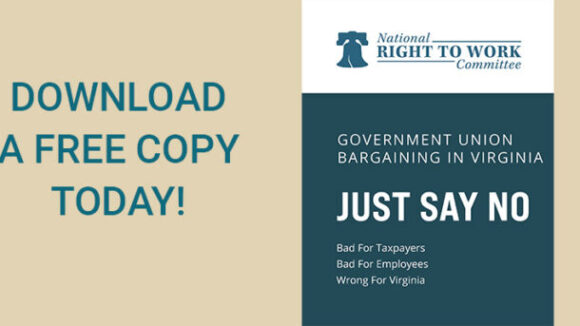Jomar Car Wash Workers Free From RWDSU Union Stronghold
Jomar Car Wash employees have been freed from the RWDSU union stronghold, thanks to help from the Right to Work Legal Defense Foundation.
 A New York State law that determines arbitration awards for unions threatening to strike for more taxpayer money bases its outcome on the government’s “ability to pay.” With taxpayers footing the bill, Big Labor always seems to win greater benefits and pay — all at the cost of taxpayers’ “ability to pay” more. From the New York Post’s Nicole Gelinas:
A New York State law that determines arbitration awards for unions threatening to strike for more taxpayer money bases its outcome on the government’s “ability to pay.” With taxpayers footing the bill, Big Labor always seems to win greater benefits and pay — all at the cost of taxpayers’ “ability to pay” more. From the New York Post’s Nicole Gelinas:
Last week, a set of arbitrators gave a union, covering Staten Island and Queens bus workers, the same generous contract that a different arbitration panel awarded to the Transport Workers Union three years ago. It’s a bad sign for the Metropolitan Transportation Authority’s (MTA) future — including its near future, because the TWU contract is up again.
At the heart of the problem is a gaping flaw in the state’s supposedly tough Taylor Law — namely, the way it forces the MTA into binding arbitration.
New Yorkers don’t hear much about the 45-year-old Taylor Law unless transit workers are threatening to strike.
But the law does much more than prohibit public workers from striking or threatening to strike, more even than imposing penalties for illegal strikes.
It also orders that, when public unions and their employers can’t agree on contracts, “disputes over wages and other contract clauses shall be submitted to [so-called] impartial recommendations so that government workers will not be shortchanged by administrators chronically lacking funds.” Basically, unelected bureaucrats give other bureaucrats raises.]
A state panel, the Public Employment Relations Board, makes those recommendations. And, for the MTA, the law directs that these “recommendations” are binding — so, even if arbitrators devise a horrible deal, taxpayers are stuck.
Lately, the deals have been bad — and it could get worse.
Nearly three years ago, PERB arbitrators decreed that workers at the TWU, the MTA’s biggest union, should get raises of 11.5 percent over three years, with a decrease in how much they pay toward health care. The cost is $272 million a year.
The risk here is obvious: If an expired TWU contract goes to arbitration, the results could cost another $300 million a year — at a time when the MTA still faces deficits plus no good way to fund capital investment.
You might think such factors would indicate an inability to pay. But the MTA has been asserting that it has largely fixed its capital problem; even though critics (like me) have warned that this “solution” consists of massive borrowing, the claim could easily work against it.
Plus, the PERB arbitrators are creative. In the latest case, the majority endorsed union shill James Parrott’s suggestion that the MTA can easily afford raises — because it can exploit public anger at banks to get out of some financial contracts that are losing it money. That’s right: The arbitrators thought it was just fine for the MTA to break other contracts to fund pay rises in the labor contract.

Jomar Car Wash employees have been freed from the RWDSU union stronghold, thanks to help from the Right to Work Legal Defense Foundation.

Just say no to government union bargaining in Virginia In our Republic, all citizens have a right to petition their elected officials for redress of grievances, but no one should have special access to decisions over spending public funds, which monopoly bargaining grants union officials.

Joe Biden Threatens U.S. Communities’ Safety -- And this year U.S. presidential challenger Joe Biden, now favored to win in November according to most polls, is backing an even more expansive scheme to enhance the power of government union bosses in all 50 states...